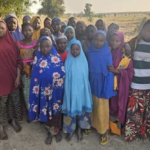A State High Court sitting in Jos, Plateau State, has issued a perpetual injunction directing the Nigerian Army and the General Officer Commanding 3 Armoured Division, Maxwell Khobe Cantonment, to immediately vacate and dismantle all illegal structures erected on a disputed parcel of land at Adisindu village, Dutsen Kura, in Bassa Local Government Area.
The land, measuring 1.449 hectares and covered by Certificate of Occupancy No. PL56329, belongs to Dr. Mawo Abaya, a missionary and founder of the International Centre of Evangelism, LEADERSHIP reports.
Through his legal representatives, Harry Partners, Dr. Abaya sought several declarations affirming his ownership and challenging what he described as the Army’s “unlawful entry, surveying, digging, and erection of structures” on his property.
He told the court that the land originally belonged to the Ati Adeji family of Igbak-Kago village, which sold it to him under a validly executed sale agreement dated September 17, 2017, after which he obtained a Certificate of Occupancy from the Plateau State Ministry of Lands.
Dr. Abaya said he first noticed the Army’s encroachment in 2022, when soldiers fenced off the property. Despite notifying the Army of the “wrongful trespass” and his intention to seek redress, construction reportedly continued.
The Nigerian Army, however, argued otherwise. It presented one witness—the Acting Director of Legal Services, 3 Armoured Division—who claimed that the entire expanse of land, measuring 7.76 square miles, was acquired by the Federal Ministry of Defence in 1973 in two phases from the Rukuba community. He insisted that compensation was paid in 1995 and argued that Dr. Abaya purchased the land “in error” as it formed part of the area previously acquired for military use.
He further asserted that the Plateau State Ministry of Lands had once issued, and later withdrew, a Right of Occupancy on the same land for a Police Post-Retirement Housing Scheme—another indication, he said, that the claimant had no valid title.
But in his ruling, Hon. Justice S.D. Samchi held that the Nigerian Army failed to provide credible and convincing evidence that the land formed part of the vast area compulsorily acquired by the Federal Government in the 1970s.
The judge noted that the Army’s documents—including acquisition papers, survey plans, and compensation records—did not satisfactorily link the disputed parcel of land to any earlier acquisition.
He ruled that the Army’s act of fencing off the land amounted to trespass, stressing that their conduct created “psychological distress and apprehension” for Dr. Abaya. Consequently, the court awarded N3 million as general damages.
Justice Samchi granted reliefs 1–7 sought by the claimant, including:
A declaration affirming Dr. Abaya as the legal and beneficial owner of the property;
An order directing the Nigerian Army to vacate the land and remove all illegal structures;
A perpetual injunction restraining the Army from further interference or development on the land.
The Army’s counterclaims were dismissed in their entirety.
“This shall be the judgment of the court,” Justice Samchi declared.



